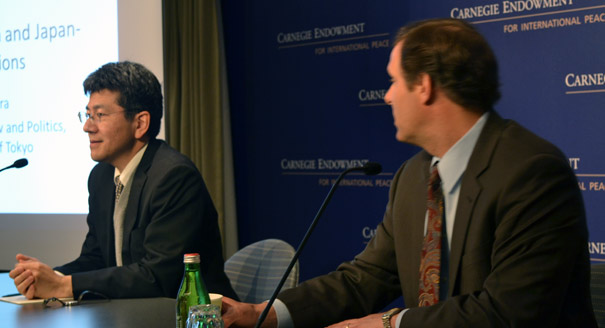Registration
You will receive an email confirming your registration.
Current tension in Japan-China relations has implications beyond short-term concerns about an accidental clash at sea or a drop in bilateral trade. Tokyo University Professor Akio Takahara discussed how China’s management of near-term diplomatic challenges could impact its own political development over the long run and its potential impact on the region. Carnegie’s James L. Schoff examined the role of the U.S. rebalance to Asia and the U.S.-Japan alliance in this context.
China’s Rise
Japan has always supported China’s stable development, but it is concerned whether its rising national power will translate into peaceful policy, stated Takahara. This concern is manifested by China’s aggressiveness on the maritime issue since 2008.
- South China Sea: In the South China Sea, China’s maritime force has driven away the Philippines away from the Scarborough Shoal.
- East China Sea: In the East China Sea, China has stoked tension with Japan around the Senkaku Islands.
Background for China’s Maritime Advancement
- International Environment: After the 2008 global financial crisis, Beijing realized it had an opportunity to increase its assertiveness in the foreign arena, Takahara said.
- U.S. Pivot: The U.S. rebalancing to Asia generated a two-fold response from China, Takahara asserted. On the one hand, Beijing returned to a policy of low-profile diplomacy toward Washington. On the other hand, the Chinese government heightened its alert against potential containment or encirclement as a result of the U.S. reinforcement of its Asian alliances. Schoff suggested that the U.S. government needs to execute its policy carefully in order to avoid negative reactions from Beijing. Washington should also pay greater consideration toward other pillars of its rebalancing beside security, such as economic, diplomatic, and environmental issues, he added. Washington can use its alliance with Japan to engage China on a non-military level, and it can use its relationship with China to mitigate the rising regional tension recently caused by North Korea.
- China’s Internal Debates: Chinese scholars are split over what the country’s future course should be, Takahara asserted. One side claims that the country’s international status has never been higher. The other side disagrees, citing the serious problems that China faces as a developing country. Wen Jiabao, China’s former premier, himself supported reforms in both the political and economic spheres, but his stance was met with formidable opposition from the Chinese leadership, Takahara added.
- Two Camps of Ideology: Takahara described two camps on the purchase of the Senkaku islands by Japan. The first he said were reformist, internationalist, and moderate, while the second he described as conservative, chauvinist, and hardliner. The hardliners contend that Japan’s act was open provocation and serious territorial challenge, he said. However, the moderates maintain that the purchase was intended by Japan to cool things down, and had nothing to do with the sovereignty issue.
- Dissatisfaction and Popular Anxiety: There has been rising dissatisfaction among the public in China, due to rising income gap, serious corruption and nepotism (“hukou” system), and various conflicts of interest between peasants and city residents, minorities and Han, and other such dichotomies, Takahara said. This has caused a rapid increase in the number of people who are nostalgic for Mao as well as an increase in those who describe themselves as religious, explained Takahara.
- Rise in Nationalism: The Chinese Communist Party (CCP) has taken advantage of the rise in nationalism to garner support for its foreign policy, Takahara said. This natinoalism is an indispensable pillar of the CCP’s claims to legitimacy, and patriotic education is a critical means of propaganda. Thus, the “Chinese dream” has been taken over by the “China dream,” Takahara contended.
Policy Recommendation on the Senkaku Islands Dispute
- Agree to Disagree: For the short term, China and Japan should agree to disagree as suggested by Takahara. China needs to stop sending vessels to the islands and Japan should maintain the situation that has existed since 1972.
- Enhance Bilateral Relations: In the long run, both sides should reinforce the resilience in their relationship, like their economic interdependence, social and cultural exchange, and cooperation in nontraditional security, and overcome the fragility that stems from their history, security, nationalism, and the status of the Senkaku Islands, Takahara said. Both governments should also implement public diplomacy to reach out to the ordinary people in order to combat chauvinism.
- Trilateral Relations: Last but not least, Tokyo, Washington and Beijing must talk over how to achieve long-term strategic coexistence, Takahara concluded.
